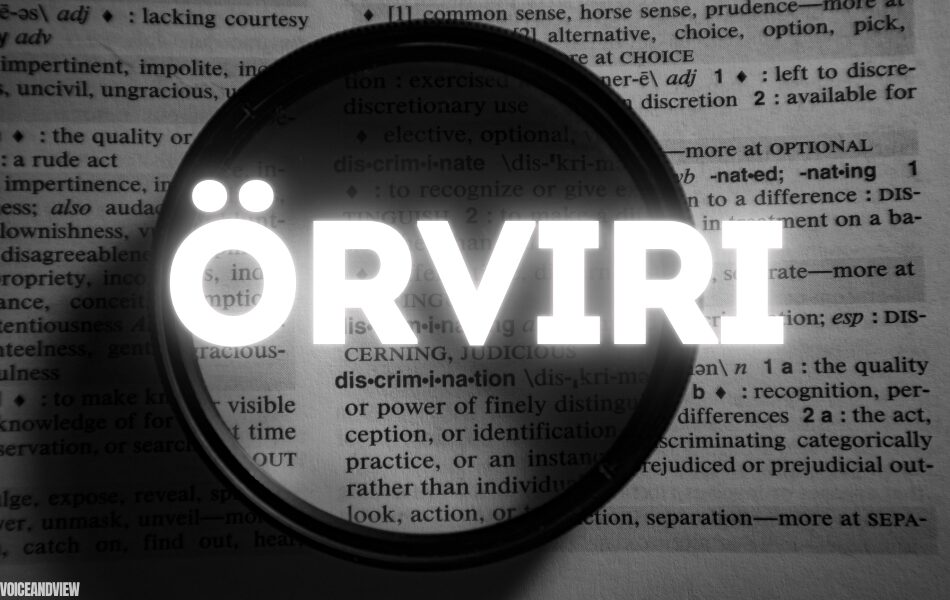Your Ultimate Guide to Örviri: Uncover the Mystery

Have you ever encountered a word so obscure, so utterly perplexing, that it sparks a burning curiosity within you? There exists a term, a linguistic relic perhaps, that has ignited the passions of linguists, historians, and culture enthusiasts alike. This elusive word “örviri” pronounced as “œrˈvirɪ”, cloaked in an aura of mystery, beckons us to delve into the depths of language and history.
Pronounced with a certain exotic cadence, this term has captured imaginations and fueled countless speculations. It is a word that seems to dance on the fringes of human knowledge, a tantalizing glimpse into a world yet unexplored. Our quest begins with a simple premise: to illuminate the shadows that surround this linguistic enigma.
We shall embark on a journey through time and language, scrutinizing ancient texts and cultural artifacts with meticulous care. By examining the broader linguistic landscape, we hope to uncover clues that might shed light on the origins and evolution of this enigmatic term. It is our belief that by understanding the context in which this word may have emerged, we can begin to unravel its true meaning and significance.
Ultimately, our goal is to piece together the fragmented puzzle of this linguistic mystery. We seek to determine whether this term is a relic of a bygone era, a forgotten echo of a lost civilization, or perhaps a more recent creation. By tracing its path through history and culture, we hope to gain a deeper appreciation for the complexities of human language and the enduring power of words.
Contents
Origins and Etymology of Örviri
To unravel the enigma surrounding örviri, we must embark on a linguistic expedition. The first step is to pinpoint its linguistic lineage. While the term itself is obscure, careful analysis might reveal clues about its origins.
Is it a relic of an ancient tongue, a linguistic fossil waiting to be unearthed? Or perhaps it is a more recent coinage, born from the fertile imagination of a poet or storyteller? To answer these questions, we must delve into historical records and explore the possibility of encountering örviri in ancient texts, folklore, or cultural artifacts. Even the most obscure references could hold the key to unlocking the word’s history.
Etymology, the study of word origins, offers another avenue of exploration. By dissecting it into its constituent parts, we might discover hidden meanings or connections to other words. Perhaps it is a compound word, formed from two or more existing terms. Or maybe it is a derivative of a more ancient root. Careful etymological analysis can illuminate the word’s potential semantic depth.
Expanding our linguistic horizons through comparative linguistics can also yield valuable insights. By examining similar-sounding words in other languages, we might identify potential cognates or borrowings. These linguistic relatives could provide clues about örviri’s meaning, usage, and cultural context. It is possible that örviri is a remnant of an ancient language family, its meaning preserved in the echoes of related tongues.
Cultural Significance of Örviri
Beyond the confines of linguistics, the enigmatic term may hold profound implications for understanding the intricate tapestry of human culture. To fully appreciate its potential impact, we must venture into the realms of mythology, folklore, and symbolism.
Does this peculiar word resonate within the echoes of ancient mythologies? Is it intertwined with the narratives of gods and heroes, or perhaps associated with mystical places imbued with otherworldly power? To uncover these potential connections, we must delve deep into the rich and varied tapestry of oral traditions and written accounts. By scrutinizing these cultural artifacts, we may discover clues that illuminate the reverence or fear this term may have inspired in the hearts and minds of our ancestors.
Folklore, the collective wisdom and beliefs handed down through generations, often preserves remnants of ancient worldviews. Are there cultural practices, rituals, or ceremonies that reference this elusive term? Does it appear in folk songs, dances, or oral histories as a symbol of good fortune, protection, or a warning against unseen forces? Uncovering these hidden connections can provide invaluable insights into the cultural context in which the term may have flourished.
Symbolism, the language of the soul, can unlock deeper layers of meaning. What images, concepts, or emotions does this word evoke? Is it connected to the natural world, the cosmos, or the human experience? Does it represent hope, fear, or a complex interplay of human emotions? By exploring the potential symbolic significance of the term, we can begin to grasp its power to shape human thought and behavior.
Finally, we must consider the possibility that this enigmatic word may have survived the passage of time. Does it continue to resonate in contemporary language or culture? If so, how has its meaning evolved? Has it retained its ancient power, or has it been diluted or transformed by the forces of modernity? Understanding the term’s potential survival can shed light on its enduring cultural relevance.
A Deeper Dive into Örviri
To truly understand the significance of örviri, we must venture beyond the realm of speculation and into the realm of scholarly inquiry. Academic research, with its rigorous methods and critical analysis, can provide invaluable insights into the word’s origins, meanings, and cultural impact.
By examining the works of linguists, historians, mythologists, and folklorists, we can construct a more comprehensive picture of örviri. Their expert opinions, based on years of research and study, can illuminate aspects of the word that might otherwise remain hidden. Incorporating their findings into our analysis can elevate our understanding of örviri to a new level.
With a foundation of scholarly research and expert perspectives, we can engage in critical analysis. By carefully examining the available evidence, we can formulate our own interpretations and theories about örviri. This process involves questioning assumptions, identifying patterns, and exploring alternative explanations. Through critical analysis, we can uncover new insights and challenge prevailing narratives.
Finally, it is essential to address any misconceptions or misunderstandings that may surround örviri. By clarifying these inaccuracies, we can contribute to a more accurate and informed understanding of the word. This includes debunking myths, correcting misinformation, and providing clear and concise explanations. By dispelling confusion, we can pave the way for a more fruitful exploration of örviri’s true nature.
Conclusion
Our exploration of örviri has unveiled a complex and intriguing linguistic and cultural enigma. While the term remains shrouded in mystery, we have managed to shed some light on its potential origins, meanings, and cultural significance.
By examining the linguistic context, exploring historical references, and conducting an etymological analysis, we have pieced together a tentative picture of örviri’s linguistic history. The word’s potential connections to mythology, folklore, and symbolism have also been explored, offering glimpses into its cultural significance. Through academic research and critical analysis, we have attempted to ground our exploration in scholarly rigor.
While this article has endeavored to provide a comprehensive overview of örviri, it is essential to acknowledge that many questions remain unanswered. The true nature of this enigmatic word may ultimately remain elusive. However, the journey of discovery has been rewarding, and it is hoped that this exploration has inspired further curiosity and research.
We encourage readers to share their knowledge, insights, or any additional information related to örviri. By collectively unraveling the mysteries surrounding this captivating term, we can expand our understanding of language, culture, and the human experience.
FAQ’s
Q: What is the origin of the word “örviri”?
A: Determining the precise origins of the term “örviri” presents a significant challenge due to its obscurity. The word does not appear in widely recognized language databases or historical records. This lack of substantial data makes it difficult to pinpoint its linguistic family, geographical origin, or historical context with certainty. It’s possible that “örviri” is a relatively recent coinage, a dialectal term, or even a misspelling or variant of another word.
Q: Is there any mythological significance to “örviri”?
A: Research into mythological or folkloric references connected to the term “örviri” has yielded no concrete results. The word does not appear in prominent mythologies or folklore collections. However, given the possibility of regional or obscure myths, a more in-depth exploration of specific cultural or geographical areas might uncover hidden connections.
Q: How can I learn more about “örviri”?
A: To expand knowledge about “örviri,” consider consulting with language experts, historical linguists, or specialists in folklore and mythology. These professionals can offer insights into potential research methodologies and point towards relevant resources. Additionally, exploring online forums, academic databases, and regional libraries might uncover hidden information or references to the term.
Q: Could “örviri” be a made-up word?
A: The possibility that “örviri” is a fabricated word cannot be entirely dismissed. Without concrete evidence supporting its existence in historical or linguistic records, the likelihood of it being a constructed term increases. However, definitive confirmation would require exhaustive research and expert analysis.





